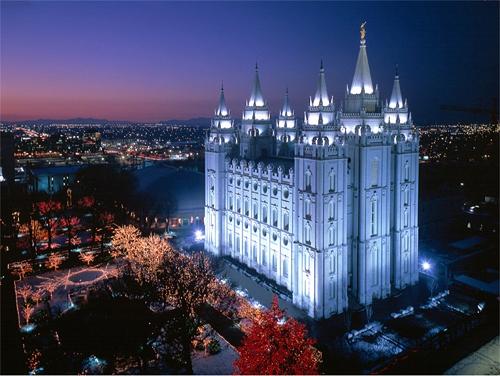The Plan of Salvation: The Purpose of Life on Earth
 The purpose of mortality is unknown to many of God’s children on earth. Many of those who believe in some sort of afterlife are unaware that there was also a premortal life before we existed on earth. The Bible speaks of a war in heaven, and says that God created the earth through The Word (Christ), but very little else is available in the Bible that speaks of premortal life. The Plan of Salvation and information regarding premortal life has been revealed to us mostly from other scriptures and latter-day revelation.
The purpose of mortality is unknown to many of God’s children on earth. Many of those who believe in some sort of afterlife are unaware that there was also a premortal life before we existed on earth. The Bible speaks of a war in heaven, and says that God created the earth through The Word (Christ), but very little else is available in the Bible that speaks of premortal life. The Plan of Salvation and information regarding premortal life has been revealed to us mostly from other scriptures and latter-day revelation.
The knowledge that we lived with God before we were born on earth changes everything. We are literally children of God and have the potential to be like Him and to dwell with Him after our lives on earth are finished. Imagining the eternities before and after earth life impresses upon us the temporary nature of life on earth. Much of what we do on earth is of little import in the eternal sense. Our most important acts on earth have to do with learning, developing faith in Christ and helping others to do so, and establishing relationships with other people that can last eternally. Such relationships are not founded on carnal desires or the fulfillment of lusts, but on eternal principles of unselfish service. Family bonds properly nurtured can continue forever.
During our premortal life, we existed as spirits. This status falls short of the perfected, resurrected body that God has. Not only did we need to progress to be like Him in personality and glory; we needed to progress to be like God physically. Thus, part of the purpose of earth life is to gain a mortal body. The mortal body is intentionally temporary, subject to corruption, injury, sickness, and death. At death, the spirit separates from the body. At resurrection, body and spirit are joined perfectly—absolutely incorruptible and immortal. Only then can men experience a fulness of joy.
There were risks for Father in Heaven in sending His children to mortal life on earth. One third of the host of heaven, who followed Satan in premortal life, had already been cast out and had lost the opportunity to progress or to gain mortal bodies. Because of the veil of forgetfulness that keeps us from remembering our premortal existence, we are largely left to find our Father in Heaven again through searching and faith. Some of us use our gift of agency unwisely and even wickedly. Heavenly Father has provided a plan to help us return to Him. He wishes to reclaim every one of His children. Heavenly Father knew from the beginning that we would sin and fall short of the purity and perfection necessary to inherit the kingdom of heaven. His plan provides for us a Savior to bridge the gap between our own failings and God’s perfection.
The Fall of Adam
Mormon doctrine proposes a different view of Adam’s fall than does all the rest of Christendom. The Fall of Adam was a necessary step in the Plan of Salvation. In some ways, Adam was foreordained to fall:
Adam fell that men might be; and men are that they might have joy (2 Nephi 2:25).
True joy can only be experienced in a perfected, resurrected body. So Adam’s fall was the first step towards that goal.
One of the first principles of the Plan of Salvation is agency. The free agency of man is central to God’s plan, and the Lord stands aside sometimes to enable us to use our agency and learn to be responsible with it. The Garden of Eden was a paradise on a different plane than the world in which we now live. Mormons call this plane “terrestrial”; it is the same quality of life we will enjoy during the Millennium. Earth life as we know it now is on a lower level, which Mormons call “telestial.” Life in the garden was free of pain and sorrow, injury and death. But the normal functioning of the human body, as far as procreation is concerned, was also absent. Adam and Eve could bear no children in the Garden of Eden. Agency, however, was guaranteed by the Lord by giving Adam and Eve opposing choices—the Lord commanded them to multiply and replenish the earth; He also commanded them not to partake of the forbidden fruit. But partaking of the fruit is what resulted in their banishment, enabling them to procreate.
Once banished from the garden, Adam and Eve became subject to two kinds of death—physical death, and spiritual death. Physical death is the death of the body, the separation of body and spirit. Spiritual death is the separation from God, who walked and talked with Adam and Eve in the garden. All of us are subject to these two deaths. The Plan of Salvation provides a way for us to overcome them both.
What about original sin?
Mormons do not believe in original sin. Mormon doctrine teaches that babies are born innocent and have no need of baptism until they reach an age when they are accountable for their own actions, can discern between right and wrong, and can understand the repentance process (understood to the be age of eight years). The second Article of Faith says, “We believe that men will be punished for their own sins, and not for Adam’s transgression.”
Little children cannot repent; wherefore, it is awful wickedness to deny the pure mercies of God unto them, for they are all alive in him because of his mercy.
And he that saith that little children need baptism denieth the mercies of Christ, and setteth at naught the atonement of him and the power of his redemption (Moroni 8:19-20).
The atonement of Christ
The most important event in earth’s history is the atonement of Jesus Christ. The atonement covers every living thing on the planet, guaranteeing the resurrection of every living person, plant, and creature. Resurrection is a free gift granted all of us by the atonement. Exaltation to a kingdom of glory, however, is a conditional gift, and depends upon our worthiness and faith unto repentance. Jesus suffered in the Garden of Gethsemane and on the cross at Golgotha for the sins of the world, yes, but also for all the sorrows, regrets, trials, and stupid mistakes of the world. Christ suffered not only our sorrows, but also God’s wrath for every sin committed throughout time, so that we might not suffer, if we would only lay hold upon His sacrifice and lay our sins upon the altar.
The only way for us to be saved is for someone else to rescue us. We need someone who can satisfy the demands of justice—standing in our place to assume the burden of the Fall and to pay the price for our sins. Jesus Christ has always been the only one capable of making such a sacrifice.
From before the Creation of the earth, the Savior has been our only hope for “peace in this world, and eternal life in the world to come” (Doctrine and Covenants 59:23).
Only He had the power to lay down His life and take it up again. From His mortal mother, Mary, He inherited the ability to die. From His immortal Father, He inherited the power to overcome death. He declared, “As the Father hath life in himself; so hath he given to the Son to have life in himself” (John 5:26).
Only He could redeem us from our sins. God the Father gave Him this power (see Helaman 5:11). The Savior was able to receive this power and carry out the Atonement because He kept Himself free from sin: “He suffered temptations but gave no heed unto them” (Doctrine and Covenants 20:22). Having lived a perfect, sinless life, He was free from the demands of justice. Because He had the power of redemption and because He had no debt to justice, he could pay the debt for those who repent (Gospel Topics: Atonement).
Ending life on earth: Death
 Death is the portal through which we must pass to move to the next stage of our eternal existence. Though it brings the grief of separation to those we leave behind, it is a temporary separation. Mormons rejoice in the knowledge that not only is there life beyond this one, but also that we are meant to be reunited with our loved ones beyond the veil. Christ’s atonement covered both forms of death, both physical and spiritual. Our physical death lasts only as long as we have to wait for resurrection, and spiritual death is banished, if we only avail ourselves of the Lord’s grace through the atonement of Christ.
Death is the portal through which we must pass to move to the next stage of our eternal existence. Though it brings the grief of separation to those we leave behind, it is a temporary separation. Mormons rejoice in the knowledge that not only is there life beyond this one, but also that we are meant to be reunited with our loved ones beyond the veil. Christ’s atonement covered both forms of death, both physical and spiritual. Our physical death lasts only as long as we have to wait for resurrection, and spiritual death is banished, if we only avail ourselves of the Lord’s grace through the atonement of Christ.
See also:
Mormon Beliefs: The Plan of Salvation
The Plan of Salvation: The Pre-existence
